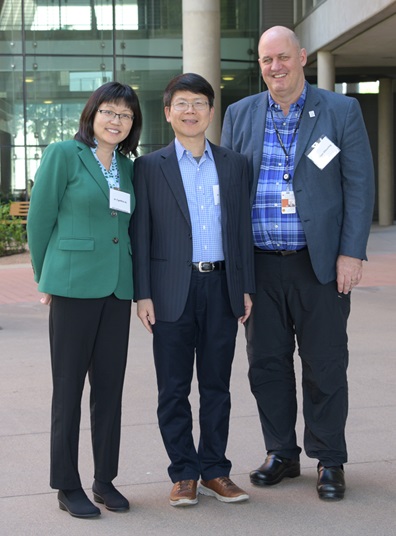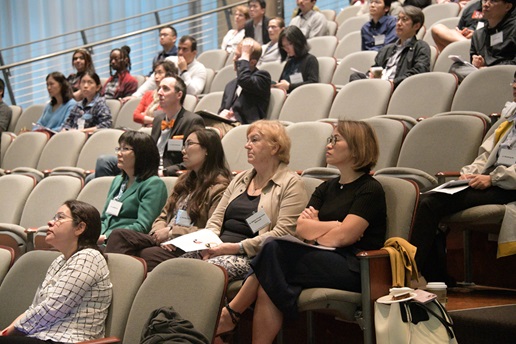2024 CPM Research Retreat
The Center for Perioperative Medicine (CPM) hosted its annual Research Retreat for 2024 at the Institute of Molecular Medicine (IMM) on Friday March 22. The retreat was titled Innate Immunity in Organ Injury; and featured a keynote speaker who is a leader in his field. Dr. Zhijian “James” Chen, University of Texas Southwestern, gave the morning keynote titled “The Enemy Within – How Does The Immune System Detect DNA as a Danger Signal?” Four sessions were included during the retreat featuring seminars given by twelve members of the center. A poster session was also held highlighting the research endeavors of the center’s lab members. At the end of the day attendees took part in a reception which allowed for further research collaborations.

Retreat Highlights
Registration and breakfast started the day. A welcome was given by Drs. Holger Eltzschig and Cynthia Ju. Dr. Zhijian “James” Chen then gave his keynote talk.
Session I – Hypoxia Signaling in Perioperative Organ Injury
Dr. Holger Eltzschig – “Targeting Hypoxia Signaling for Acute Lung Injury”.
Update on the role of hypoxia-inducible transcription factors in lung protection during ARDS. Recent studies indicate that microRNA miR-147 is induced by hypoxia-signaling during ARDS, and can dampen the replication of SARS-CoV-2. A recently completed randomized controlled trial in ARDS patients using the HIF-activator vadadustat showed encouraging results.
Dr. Xiaoyi Yuan – “HIF1A Dependent Netrin-1 Controls NK Cell Invasion in ARDS”.
Macrophages are crucial for the recovery from acute inflammation. However, the mechanisms that modulate macrophage function during this process remain unclear. This project tests the hypothesis that the HIF-dependent induction of netrin-1 in macrophages represents an endogenous protective pathway to control lung inflammation through suppression of natural killer cell invasion. This project addresses the urgent need to understand the mechanism of macrophagemediated control of lung inflammation and facilitates the development of new therapeutic targets for acute respiratory distress syndrome.
Dr. InHyuk Bang – “HIF-2A-mediated Suppression of H+-K+ATPase Confers Renal Protection From Acute Kidney Injury”.
The incidence of acute kidney injury is around 30% in patients with perioperative conditions. It causes an increase in morbidity and mortality. Our research uncovered that HIF-2A-targeted H+-K+ATPase could be a novel therapeutic target for acute kidney injury. We also suggest that pharmacological inhibitors of H+-K+ATPase could be a promising strategy for acute kidney injury.
Session II – Innate Immune Cells in Tissue Injury
Dr. Brian Skaug – “Pathogenic Effects of the DNASE1L3 R206C Variant in Systemic Sclerosis”.
My research is focused on the mechanism by which a genetic variant in DNASE1L3 increases susceptibility to the autoimmune disease systemic sclerosis. We have found that this risk variant causes loss of function, specifically that it impairs secretion of DNASE1L3 into the circulation, resulting in incomplete digestion of circulating DNA derived from apoptotic cells. We are currently exploring the downstream effects of this improperly digested DNA on the function of the immune system.
Dr. Jennifer Bailey – “Harnessing Adenosine- Immune Signaling to Improve Pancreatic Cancer Interventions”.
Update on the mechanistic consequences of elevated adenosine signaling through metaplasia-dependent expression of CD73 on chronic pancreatitis and early neoplasia. Our recent imaging mass cytometry data show pancreatic metaplasia elevate CD73 expression which results in recruitment of CD4 T cell and restrains NK cell and neutrophil intrapancreatic infiltration resulting in restored organ function. In contrast, genetic deletion of CD73 in metaplastic ducts results in elevated neutrophil and NK cell infiltration, fibrosis, edema resulting in sustained metaplasia and pancreatitis.
Dr. Ethan Roy – “Tracking Type I Interferon Signaling In The Aging Brain”.
This presentation showed new data about the presence of widespread interferon signaling in the aged brain, and functional evidence for how it negatively impacts brain health.
Session III – Innate Immune Cells in Tissue Injury
Dr. Cynthia Ju – “Role of Eosinophils in Acute Liver Injury and Repair”.
We found that in several models of acute liver injury, Eosinophils were rapidly recruited to the liver. This recruitment depended on hepatic macrophage release of eotaxin-2. Recruited eosinophils were activated by the IL33/ST2 axis to produce IL4/ IL13, which protected the liver through inhibiting neutrophils and IFNg. Moreover, the accumulation of eosinophils persisted beyond the injury phase with a peak coinciding with the peak of tissue repair. Our mechanistic studies demonstrated that eosinophil-derived IL4 activated liver macrophages to produce a growth factor, HB-EGF, which promoted hepatocytes proliferation through EGFR receptor.
Dr. Xinxin Ma – “Neutrophils-Derived miR-223- 3p Attenuates Myocardial Ischemia-Reperfusion Injury by Targeting RhoB in Endothelial Cells”.
Investigate the role of immune cell-derived microRNA 223-3p in myocardial ischemiareperfusion injury (IRI) using different mouse mice strains. We found miR-223 confers cardioprotective effect. After the identification of the target cell types and target genes of miR-223 in the ischemic hearts, we also explored the potential of genetic or pharmaceutical inhibition of miR-223 target gene RhoB (Ras Homolog Family Member B, a Rho family GTPase) as a therapeutic strategy for myocardial ischemia-reperfusion injury.
Dr. Tingting Mills – “Macrophage NUDT21- Mediated Alternative Polyadenylation in Lung Injury”.
The goal of our study is to investigate the roles of alternative polyadenylation during Acute respiratory distress syndrome (ARDS). We found that NUDT21 downregulation promotes the 3’UTR shortening of many pro-inflammatory genes and exaggerates inflammation in murine models of ARDS.
Session IV – Hypoxia-Inducible Factors in Organ Damage
Dr. Matthew DeBerge – “Hypoxia Inducible in Transplantation Tolerance”.
Transplantation tolerance holds promise to reduce complications from chronic immunosuppression and promote long-term survival in transplant recipients. As discussed in the presentation, our work revealed a novel role for hypoxia inducible factor-2 in the differentiation of monocytes into tolerogenic macrophages in an experimental model of heart transplantation. This newly discovered mechanism in transplantation tolerance has implications in other settings of immune tolerance, including pregnancy and cancer, and support its therapeutic activation in the setting of heart transplantation to promote long-term survival in humans.
Dr. Agnieszka Czopik – “HIF-2α Induces miR-29a to Restrain T cell Activity in Colitis”.
Our work focuses on role of miR-29a, a hypoxiaregulated microRNA, in the development of inflammatory bowel disease and its potential as a therapeutic agent. We identified miR-29a as a direct target of Hif2a in the CD4 T cells. Deficiency of miR-29a in the T cells leads to an increased IFNy production and proliferation, highlighting the protective role of this microRNA in limiting aberrant T cell activation in colitis.
Dr. Vayalanellore Giridharan – “Long COVID’s Impact on Mental Health: A Focus on the Gut- Brain Axis”.
Long COVID, a condition characterized by symptoms that persist for weeks or months after the acute phase of COVID-19, has been reported to significantly affect mental health. Emerging research has highlighted the gut-brain axis, a bidirectional communication system between the gastrointestinal tract and the central nervous system, as playing a crucial role in mental health. In their recent cross-sectional study, significant gut dysbiosis was observed in long COVID patients. While there were no significant changes in psychiatric scales, profound modifications in the mucin-degrading Akkermansia genus were noted in the long COVID population. Giridharan and the team believe that understanding the gut-brain axis in the context of long COVID could offer potential avenues for therapeutic interventions.

Poster and Symposium Awards
1st place faculty – Dr. Yankai Wen
1st place trainees – Dr. Asif Zaman
2nd place trainees – Dr. Simon Betancourt-Escobar
2nd place trainees – Dr. Fenfen Wang
Reception